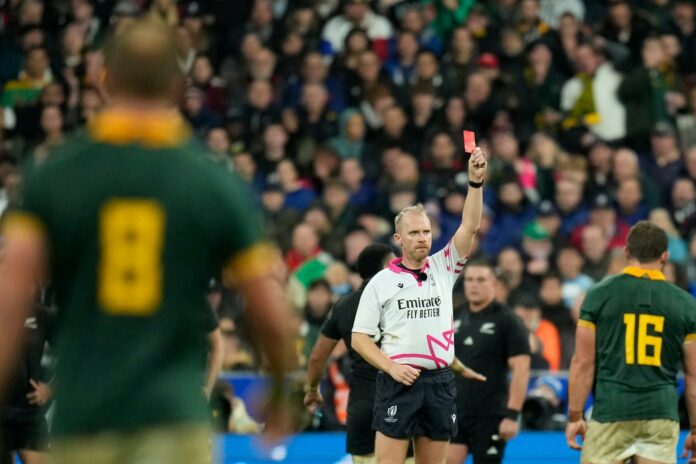
[ad_1]
English referee Wayne Barnes, during the Rugby World Cup final between New Zealand and South Africa, on October 28, 2023, at the Stade de France, in Saint-Denis, Seine-Saint-Denis. CHRISTOPHE ENA / AP
Did you try to learn the rules of rugby by heart to follow the 2023 World Cup in France? You’ll have to go back to the drawing board for the Autumn Internationals. On Saturday, November 9, at the Stade de France in Saint-Denis, northern Paris suburbs, Les Bleus have a double mission: To face Japan – the first of their three opponents this month – and to adapt to a few minor changes in their sport’s rulebook.
Scorers will now have just 60 seconds to attempt a conversion (compared with 90 in the past), while touches and scrums will have to be played in under 30 seconds. Apart from forcing the players to quickly get back into their roles, these first two changes shouldn’t have too much impact. The third change will. Along with the yellow card (exclusion for 10 minutes) and the red card (total exclusion), a newcomer will appear in the referees’ pocket: the 20-minute red card.
The player to whom it’s shown will be asked to leave the pitch and not return for the rest of the game. But his team will not be penalized as much as for a “normal” red card, since they will have the opportunity to bring on a substitute 20 minutes later. On Thursday, November 14, the 53-member board of World Rugby – the governing body of the world of rugby – will vote on whether or not to generalize this new rule, aimed at limiting the number of matches ending with one team down, and therefore the number of unbalanced matches.
‘Protect the players’
“Any act of deliberately dangerous play will continue to be punished by a permanent red card,” World Rugby told Le Monde. Temporary red cards would be issued for “technical errors resulting in unfair play,” such as accidental contact to the head during a tackle. In this second case, the “bunker” – a video referee responsible for making a decision while the match resumes, another recent invention – would review in detail the action deemed illegal by the field referee, to decide between a yellow card and a 20-minute red card.
This card will be the same color as the one permanently excluding a player. “There is no need for an orange card, as the referee’s explanation will be given via broadcast and in the stadiums,” the international body explained. It remains to be seen how these clarifications will be received in the stands, given that a “deliberately dangerous act of play” is not always distinguishable from a “technical error” in rugby.
In France, at least, there is no debate: The authorities are up in arms against the reform. “The red card is a crucial tool for deterring a lack of sportsmanship and protecting players’ physical integrity. Transforming this into a temporary expulsion could encourage dangerous behavior,” the French Rugby Federation, the National Rugby League and Provale, the players’ union, said. These concerns are also echoed abroad, notably in Ireland.
You have 44.2% of this article left to read. The rest is for subscribers only.
[ad_2]
Copyright for syndicated content belongs to the linked Source link

